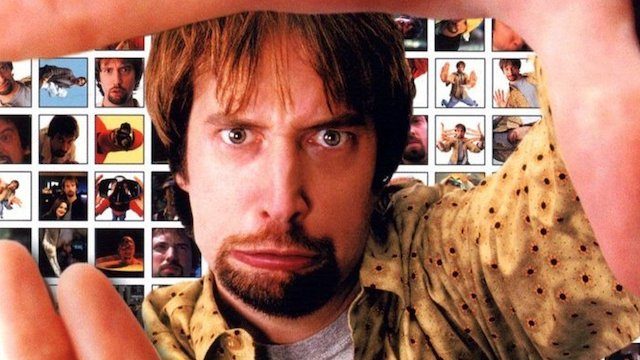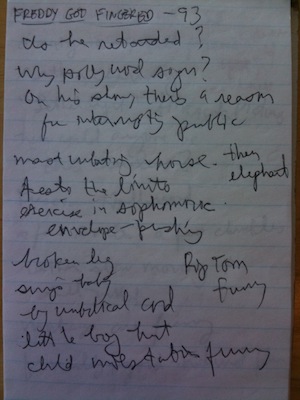
For 10 years, my go-to answer when someone asks what’s the worst movie I’ve ever seen has been “Freddy Got Fingered.” There might be movies I’ve seen that were just as bad (especially since I started doing the Eric’s Bad Movies column), but I definitely can’t think of anything worse.
Vividly do I recall the screening. Many people walked out — and this was one of those free promotional screenings, where the crowd is filled with rubes and hobos who will watch ANYTHING as long as it’s free. There was much agonized writhing on the critics’ row (and, yes, even one walkout); afterward, we felt like we’d survived a harrowing trauma together, like the Oceanic 6 on “Lost.” (Fellow critic Sean Means after I recently brought it up and called us “shell-shocked survivors”: “I’ve seen some things, man.”) The reviews nationwide almost universally were not just negative but scathing. And despite Tom Green’s then-current popularity on MTV, audiences were likewise repelled by his movie. It opened in fifth place and sank like a stone from there.
But after a couple years a curious thing happened. People began to speak positively of “Freddy Got Fingered.” It developed a cult following. That happens to almost all bad movies, but “Freddy Got Fingered” was being championed by such estimable writers as the A.V. Club’s Nathan Rabin and IFC’s Vadim Rizov. That’s in addition to The New York Times’ A.O. Scott, the only major critic who gave the film a positive review right from the start.
These supporters don’t generally claim that the movie made them laugh uproariously from beginning to end. Instead, they describe it in terms of fascination: “It’s confrontational in a very real, near-avant-garde way” (Rizov). “It helps to see ‘Fingered’ less as a conventional comedy than as as borderline Dadaist provocation, a $15 million prank at the studio’s expense” (Rabin). “The movie’s comic heart consists of a series of indescribably loopy, elaborately conceived happenings that are at once rigorous and chaotic, idiotic and brilliant” (Scott).
Clearly these writers saw something about the film that I didn’t, something beyond just “this is gross and not funny” and more fundamental about its very nature. In the back of my mind, I had always suspected that there was more to “Freddy Got Fingered” than I’d given it credit for. It’s just too bizarre, too single-mindedly excruciating, not to have been that way at least partially on purpose. Since I am brave, I ventured to give it another try.

What I said then:
“Is ‘Freddy Got Fingered’ the worst movie ever made? I don’t know; I haven’t seen every movie ever made. But of the couple thousand or so I have seen, there’s no contest. This is the worst. The film has a clear contempt for its audience…. The only reason [the character] would be acting this way would be if he were severely retarded…. We’ve seen outrageousness and crassness be funny before. It is not funny here. There are no characters to identify with. There is no underlying sweetness. There is no subtle good-natured outlook. There is only caustic ugliness…. Dull, insipid, horrific, uninspired, painful, ill-conceived, amateurish, embarrassing, foolish, moronic. These are the only printable words I can think of for ‘Freddy Got Fingered.’ No, wait, I thought of some more. Vapid, boring, stupefying, unoriginal, cynical, illogical, slow-moving, malodorous and putrid. Do not, under any circumstances, see this movie.” Grade: F [complete review]
The re-viewing:
When people have defended the film directly to me, their accounts of enjoying it have shared the common theme of concurrent marijuana consumption. I do not doubt that this, or indeed almost any broad comedy, is more pleasant when the viewer is stoned, but that’s no way to conduct a serious professional experiment. We are scientists, dammit. I wasn’t under the influence of anything when I saw it in 2001, nor was I when I saw it last week.
The film certainly isn’t misleading. It’s barely 10 minutes old before Tom Green’s character, Gord Brody, stops by the side of the road to masturbate a horse, graphically, and for no narrative reason whatsoever. The message is clear: It’s gonna be that kind of movie. The kind of movie where that kind of thing happens. Whatever kind of movie that may be.
Over and over again, Green will set up a comedy bit and then fail (or refuse) to give it a punchline. Things happen randomly; they happen for a couple minutes; then they stop happening and we move on to something else. There is only the barest skeleton of a plot. Normally, a comedy writer might conceive a hilarious image — say, a guy swinging a newborn baby around by its umbilical cord — and then come up with the path that leads to it, the series of events that would plausibly culminate in such an outrageous act. Green ignores this and instead goes right to the insane images: swinging the baby around, playing a keyboard with sausages tied to his fingers, masturbating a horse, licking the exposed bone of man who has broken his leg, and so on, with no pretense of setup.
So the question is this: Does Green not understand how to make comedy, or does he understand the rules and is violating them on purpose? The chief difference between your illiterate Facebook friend and an avant-garde novelist is that the latter knows the rules of grammar and style and intentionally disregards them, and the former simply doesn’t know them.
The answer lies within the film itself. I was struck, as so many of us have been over the years, by the words of Anthony Michael Hall. He plays an animation-studio honcho to whom Gord has pitched his cartoon ideas. He says:
“Your drawings are pretty good. But it doesn’t make any sense. It’s f****** stupid. OK? What you need here is elevation. There actually has to be something that happens that’s actually funny. What the f*** is happening here?”
Since it’s unfathomable that Green included these lines in his screenplay without being aware that they also applied to his movie, let’s consider why he had a character address the film’s deficiencies so directly. It seems to me that they are not “deficiencies” in the sense of being mistakes, because Green is doing it on purpose. He understands comedy perfectly well and is deconstructing it.
For example, one of the hallmarks of comedy is slapstick. We laugh when somebody falls down. We don’t usually laugh, however, if it looks like the person has been injured. If it looks painful, we wince rather than laugh. Green plays with this throughout the movie. Gord’s buddy Darren (Harland Williams) skateboards down a ramp, falls — and shatters his leg in a horrific manner. He screams in agony, the bone protruding from the wound. The gore isn’t absurdly over-the-top (and thus still funny), as when Monty Python’s quaint picnic turns into a bloodbath. Instead, it’s gruesome and realistic. Green doesn’t expect us to laugh at the image. He expects us to be repulsed by it, and therefore to laugh at how inappropriate it was for the movie to feature it. The thing itself isn’t the joke; the joke is the fact that the thing was included in the film at all.
Similarly, there’s the running gag of the young neighbor boy who keeps being injured, always bloodily and painfully. Where we’d normally laugh at someone being hit in the face with a baseball, we’re aghast when this poor kid comes away screaming with a bloody mouth and chipped teeth. It could be that Green is criticizing the audience’s taste in humor — “You think it’s FUNNY when someone falls down?? I’ll show you what it REALLY looks like!” — but I doubt it. I think he’s just messing around with it, taking it apart to see if it still works, and demonstrating that it doesn’t. Why? I dunno. For fun?
But it gets even more meta. There are certain taboos in comedy. To name just a few, you’re not supposed to hurt kids (especially babies) or women, or make jokes about sexual molestation, or engage in bestiality. To disregard such taboos is to tread on dangerous ground, comedywise. The audience has to understand, first of all, that you KNOW it’s a taboo, and that you’re violating it intentionally. You also have to be extra-clever about it — an ordinary effort won’t do when you’re working uphill.
I think Green is aware of all this, and in “Freddy Got Fingered” he completely ignores it. All of those things (and more) are joked about, and never with any good reason or clever setup or comedy payoff. The film’s title comes from Gord’s baseless accusation that his father molested his younger brother — a plot point that doesn’t show up until halfway into the film, and then is quickly disregarded. So not only does Green violate the taboos, he violates the rules about how to violate the taboos.
There are also scenes of flat-out absurdity, like the one where Gord puts a suit on backwards and sings “Backwards Man,” or when he goes scuba-diving in the toilet. These fall into another category, one that’s somewhat more common: we laugh at the stupidity of it, and then laugh at the fact that we laughed at it. (For examples of this kind of thing that did a better job of it, see “Hot Rod” or “The Brothers Solomon.”)
One of my sticking points 10 years ago was the brief scene in which Gord gets a job at a cheese-sandwich factory and immediately starts behaving in an embarrassingly vulgar fashion in order to discomfit his fellow employees. It’s the kind of stunt Green did a lot of on his MTV shows. But there, he was himself, Tom Green, the cameras were hidden, and the witnesses were innocent bystanders. The laughs came from seeing their stunned reactions to Green’s unexplained nonsense. In the movie, Green is playing a character, and the people observing his idiocy are paid extras. In other words, Tom Green has a reason to act that way; Gord Brody doesn’t.
There are two possibilities here. One is that Green wanted to duplicate the kind of prank he did on his MTV show but failed to grasp that it wouldn’t work in this context, failed to understand that what makes it funny on TV is that the bystanders aren’t in on the joke. The other possibility is that Green knew it wouldn’t work and did it anyway. I’m inclined to think the second option is the truth. He took the comedy apart to see if it would still work, and demonstrated that it didn’t. Why? I dunno. For fun?
Do I still hate this movie?
Well, yes. The fact that it’s irritating and tiresome on purpose doesn’t make it any more bearable. Whether someone hits you in the head with a hammer intentionally or by accident, either way, you still got hit in the head with a hammer. But I do understand the film better now, and as a comedy nerd I can appreciate — notice I do not say enjoy — Green’s bizarre experiment. Just as I wouldn’t recommend “Birth of a Nation” to anyone but the most hardcore students of film history (or racists), I wouldn’t recommend “Freddy Got Fingered” to anyone but the most devoted students of the comedic arts (or stoned people). Grade as a source of entertainment: F Grade as an experiment: C
— Film.com




